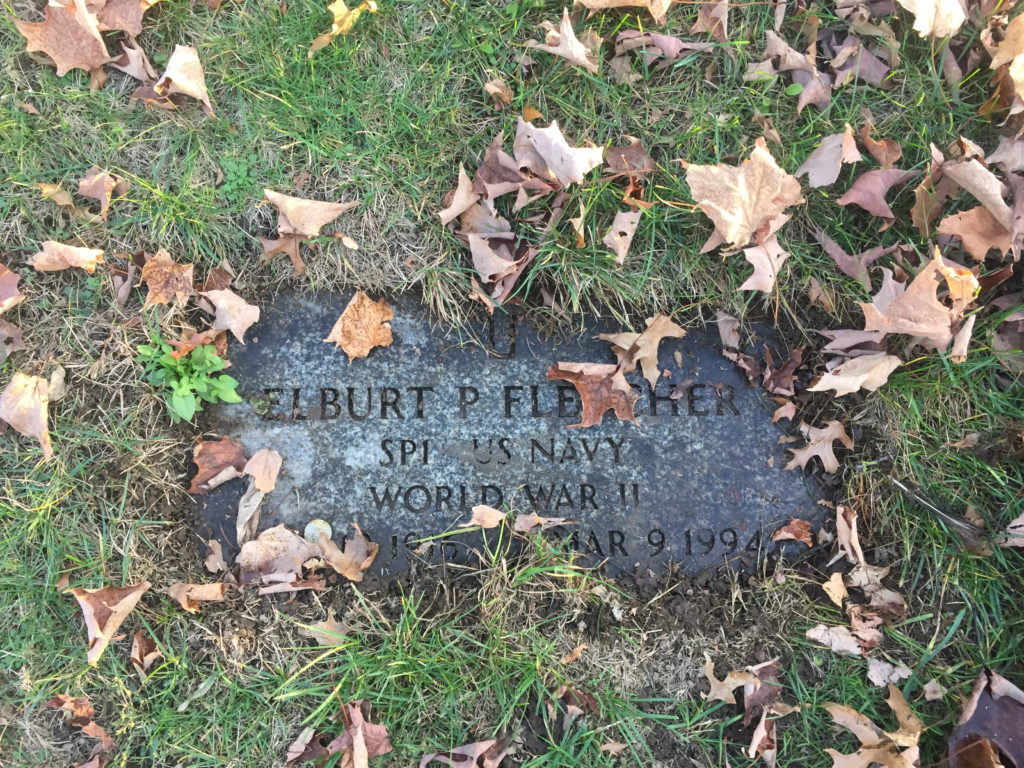Erik Visits an American Grave, Part 828
This is the grave of Elbie Fletcher.

Born in 1916 in Milton, Massachusetts, Fletcher grew up in the Boston area. His father was a traveling salesman for an elevator company. Fletcher had to work as a child at a local vegetable market but saved up money to go see the Red Sox and Braves play. He was a star high school baseball player. In 1934, the Boston Braves had a contest to offer a tryout to the Boston player most likely to be a major league player. Total stunt, right? Moreover, it was a popular vote, so it’s not as if the scouts were doing this. Fletcher had quite a large family. So he won the contest. And then…..he made the team and stayed in the major leagues for the next 15 years, outside of a couple of years in World War II, when he was in the Navy. During the war, he was assigned to the Naval Training Center with other big-leaguers, basically to provide entertainment to the troops.
An old story about Fletcher. The Braves were training in Florida and so the first spring training he participated in, Fletcher got on the train. He realized that he could order whatever he wanted. So every day, he just ordered steak for breakfast. I mean, he was no rich kid and this was a big deal to him! This led to….some digestive problem. He had to get an enema and from that point on, one job of his coaches was making sure that he ate some fiber.
As a major leaguer, Fletcher was a solid, if not spectacular first baseman, for the Braves from 1934-39 and then the Pirates from 1939-47, followed by a brief return to the Braves in 1949. He didn’t have a ton of power and lost parts of a few years to injury. But he was an OBP machine in an era this wasn’t necessarily so valued. With OBP more highly valued today, he comes across as an all-star caliber first basemen when he was at the peak of his powers, in the early 40s with Pittsburgh. He led the league in walks in 1940 with 119 and 1941 with 118. He led the league in OBP in 1940, 1941, and 1942. But he had so little power, that in 1942, his OBP was actually higher than his slugging percentage, when he hit .289/417/393. Some of his improvement may be that he moved from Braves Park, which was a horrible hitter’s park, to Forbes Field, which was more favorable. When he came back from the war, Fletcher was back up to his old tricks, walking a mere 111 times while striking out only 37. But by then he only hit 4 home runs and he declined fairly quickly after that. He was also an excellent defensive first basemen, leading the league in assists six times and was well known for being a master of digging the ball out of the dirt on an errant throw.
In 1946, the first effort to unionize baseball players took place with the Pirates. The American Baseball Guild had formed and targeted the Pirates as a test to see what it could do. The reason was that Pittsburgh itself was such a pro-union town. The Pirates also had lots of old veterans who had been around the ropes and seen how little they really got. Fletcher himself had to work during the off-season. The team was sharply divided, with Fletcher and Bob Elliott leading the anti-union faction. So that was unfortunate and it would be nearly another three decades before baseball would become a union sport.
After retirement, Fletcher worked as a salesman before getting a job as the director of recreation for Melrose, Massachusetts, basically being in charge of the parks department. He did this until he retired.
Fletcher died in 1994 in Milton, Massachusetts at the age of 77.
Elbie Fletcher is buried in Milton Cemetery, Milton, Massachusetts.
If you would like this series to visit more first basemen, you can donate to cover the required expenses here. According to Baseball Reference’s JAWS statistic, Fletcher is the 62nd best first basemen of all time. Jim Bottomley, the 1928 MVP who ranks 58th on the list, is in Sullivan, Missouri, and Mickey Vernon, who was a long-time Washington Senator and who ranks 64th on the list, is in Linwood, Pennsylvania. Previous posts in this series are archived here.


